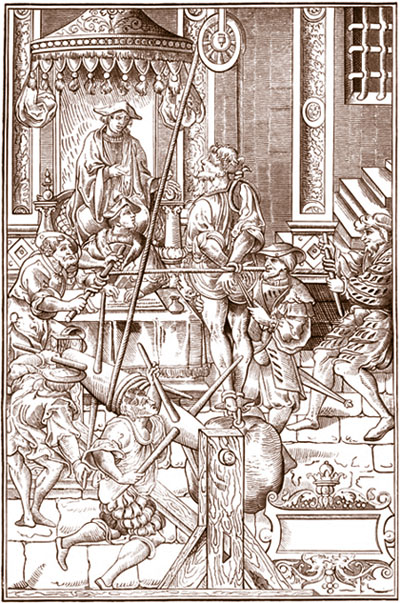 It is a well known fact that torture was the prime method of producing evidence during the trials of the Knights Templar in the early 1300s (for more info on this see: The Knights Templar Absolution). Thomas Keightley in his Secret Societies of the Middle Ages provides this perhaps too vivid account of torture methods that the Templars were likely to have undergone prior to their “confessions”:
It is a well known fact that torture was the prime method of producing evidence during the trials of the Knights Templar in the early 1300s (for more info on this see: The Knights Templar Absolution). Thomas Keightley in his Secret Societies of the Middle Ages provides this perhaps too vivid account of torture methods that the Templars were likely to have undergone prior to their “confessions”:
“As our readers fortunately cannot be supposed familiarly acquainted with the mild and gentle modes employed by the brethren of St. Dominic, for eliciting the truth, we will present a slight sketch of some of them, that they may be able to form some idea of the value of rack-extorted testimony. Sometimes the patient was stripped naked, his hands were tied behind his back, heavy weights were fastened to his feet, and the cord which confined his hands passed over a pulley. At a given signal he was hoisted into the air, where he hung suspended by his arms, which were thus drawn out of their natural position: then suddenly the cord would be let run, but checked before the patient reached the ground, and thus a tremendous shock given to his frame. Another mode of torture was to fasten the feet of the patient on an instrument, which prevented his drawing them back; they were then rubbed with some unctuous substance, and set before a flaming fire; a board was occasionally placed between his feet and the fire, and withdrawn again, in order to increase his pain by intervals of cessation. The heel of the patient was at times enclosed in an iron heel, which could be tightened at pleasure, and thus caused excruciating pain. What was regarded as a very gentle mode, and only indulged to those who had not strength to undergo the preceding tortures, was to place round sticks between their fingers, and compress them till the bones of the fingers were cracked. The teeth of the Templars were occasionally drawn, their feet roasted, weights suspended from all parts of their bodies; and thus they gave their testimony without constraint!
What is understood as testimony or confession, by inquisitors, is an affirmative answer to such questions as they ask. They usually assume the guilt of the accused; and no witnesses for the defense are heard. It is useless to prove the absurdity and unreasonableness of the charges; for that would be impugning the sense and judgment of those who gave ear to them; and promises are always held out that, if full and free confession is made, the criminal will he gently dealt with. The accused is, moreover, always confined in a solitary cell; he has none to console and cheer him; he feels abandoned by the whole world; conscious innocence is of no avail; his only hope is in the mercy of his judge. The Templars, we must recollect, were seized towards the commencement of winter; and at that season a dungeon of the middle ages must have been cheerless beyond description. They were barely allowed the necessaries of life; they were stripped of the habit of the order, and denied the consolations of religion, for they were treated as heretics; and they were shown a real or pretended letter of their Master, in which he confessed the crimes of the order, and exhorted them to do the same. Enthusiasts in religion or politics are supported by the consciousness of rectitude, and bear up against privations or torture in firm reliance on the favour of the Divinity, or the praise and esteem of a grateful and admiring posterity. But the great majority of the Templars were far from being such characters; they were illiterate knights, who had long lived in luxury and indulged in arrogance; they knew themselves to be objects of dislike to many, and felt that their power was gone. Need we then be surprised that, beguiled by the hopes held out, numbers of them readily acknowledged all the charges made against their order? and must we not so much the more admire the constancy of those who, unseduced by flattering hopes, and undismayed by menaces and torture, yielded up their breath rather than confess a falsehood?”
See also:
Divine judgment upon Clement V and Philip the Fair
Malcolm Barber, “The Trial of the Templars”


0 comments… add one